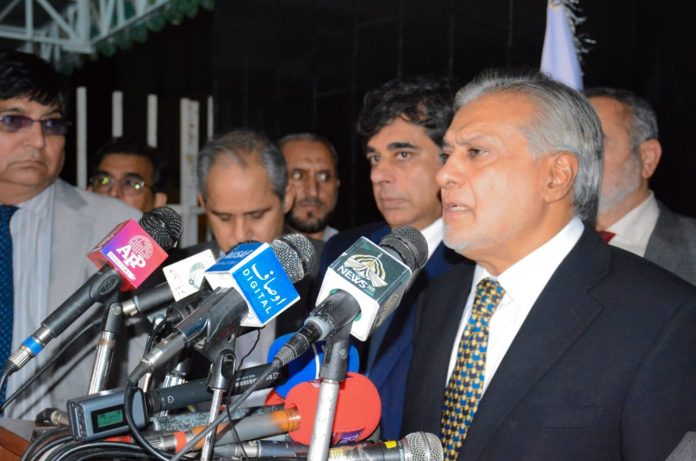It is time for the Finance Minister to show the world how Pakistan can overcome its chronic macroeconomic imbalances and become solvent in short order – and so much rides on his success.
By Muhammad Ali
ISLAMABAD: It is time for Pakistan’s new Finance Minister to sell his vision of the country’s economy to the world in general and the World Bank group in particular – and Senator Ishaq Dar, ready to visit Washington DC this week, believes his business plan checks all the boxes.
In his public pronouncements in the run up to his departure for the US Capitol on Monday, the veteran finance czar has insisted that his plan for the economy does not involve a restructuring of Pakistan’s bilateral Paris Club debt.
He has also asserted that Pakistan is fully committed to the stringent economic reform package it signed up to under an International Monetary Fund (IMF) bailout – a key tenet of which is to stay on-budget throughout the current fiscal.
Apparently, the only ingredient of success lacking in his view is hard currency inflows – which he hopes to secure with the understanding of the World Bank Group and the global corporate finance gatekeepers like Moody’s.
An old hand at managing Pakistan’s economy, Dar is moving with extreme caution, pulling all the strings to make a success of his visit. As a preparatory move, he met with Donald Blome, US Ambassador Pakistan, ostensibly to open a line of communications with the US Treasury.
On the course of his visit, Dar will attend the annual meetings of the World Bank Group including the IMF and World Bank for a whole week. On the sidelines of the event, he and his aides including Minister of State Aisha Ghaus Pasha will hold import meetings with the representatives of IMF, the World Bank.
They will also call on the associates of credit rating agencies such as Moody’s, the venerable gatekeepers of freewheeling global capital, to show them why Pakistan’s economy is stronger than their perception of it – or, more to the point, why Pakistan is worthy of investment.
Pakistan needs support from the US and other Western countries to oil the wheels of its dealings with the international financial institutions. This is why Dar was particular to meet US ambassador in Pakistan and other important diplomats in Islamabad ahead of his visit.
Dar’s return to the helm of affairs was very well received by the domestic markets, with the bourse going on a bullish run and the rupee starting a steady climb against the greenback. His visit to Washington DC is important because Pakistan’s flood-ravaged economy needs urgent inflows of foreign exchange to keep afloat.
If Pakistan remains unable to obtain USD 5 to USD 10 billion in financial assistance from its multilateral and bilateral creditors within next few months, the feel good factor of Dar’s return to the helm will start to wear off in earnest.
Although UN Sec-Gen Antonio Guterres has provided exemplary leadership in pleading Pakistan’s case as a victim of climate catastrophe, the international financial institutions have been slow off the block, with little movement of cash in evidence as of now.
Only the Asian Development Bank (ADB) so far committed to provide USD 1.5 billion through Counter Cyclical Support for Pakistan and its Board was expected to grant approval of this program loan by third week of the ongoing month.
The Asian Infrastructure Investment Bank (AIIB) will grant approval of USD 500 million as co-financing so Islamabad will get USD 2 billion both from the ADB and AIIB within the ongoing month.
The World Bank has agreed to re-purpose USD 2 billion from the existing portfolio but has so far committed no additional funding to help Islamabad with construction in the wake of this year’s cataclysmic monsoon floods.
Much, therefore, depends on Dar’s meeting with the IMF high-ups, who hold all the levers that can make or break Pakistan’s economy.
Pakistan and the IMF high-ups are scheduled to hold parleys for completion of 9th review from last week of the current month. The Fund officials will examine very closely how well Pakistan has delivered on the actions committed under the joint 7th and 8th review.
In particular, they would be interested to see how Dar funds the power tariff subsidy he allowed five export-oriented sectors. The government made provision to provide electricity at rate of PKR 19.99 per unit with expectation to provide PKR 100 billion subsidy.
However, the IMF estimates for this allocation are said to be different. An official speaking on the background told Independent Pakistan the government may end up spending PKR 150 to PKR 160 billion for this provision.
If the government decides to provide gas at subsidized rate, the cost of the subsidy would go up to PKR 200 billion at least for the current fiscal year.
Another matter likely to come up in the discussions is the rupee’s exchange rate. Having committed to free-float the rupee, Pakistan is not expected to allow the markets to rule on the value of the local currency. Dar’s approach, as evidenced by his persistent signaling that the rupee is undervalued, may be seen as interventionist and therefore unacceptable.
Dar has to show the IMF that his policies are sound and in line with the accepted free-market norms – and he has to do it quickly because without immediate and substantial dollar inflows to support the country’s flimsy and depleting forex reserves, Pakistan risks drifting towards a default on its external obligations.
Copyright © 2021 Independent Pakistan | All rights reserved




